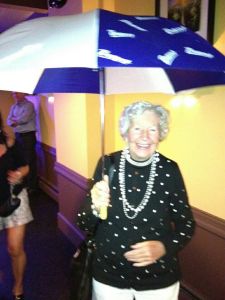Alzheimer’s disease does not need an elaborate definition nowadays because it is so common in the United States that 1 in 7 families has a family member diagnosed with Alzheimer’s disease.
“My mother was the queen bee of our family,” Coleen Arrell said. “But when my father got sick with cancer, I couldn’t understand why she couldn’t take care of him.”
Coleen’s mother, Rosemary Duffy, came from a family of seven brothers and sisters. Before she had her five children, she started the first women’s basketball team at the Catholic School, Our Lady of Fatima, and coached for about 20 years. After her children were born she worked a full time job at a trucking company and began working nights.
Not only did she work full time but also she took on the role of her family’s caretaker. “She took care of everything like all moms do,” Coleen said. “She took in a lot of people, her sick sister Fran and her children, my cousins Carolyn and Timmy, cousins from North Carolina and more. My house was always crowded with people.”
The first signs of dementia were recognized by Coleen and her siblings when Rosemary was not able to take care of her husband who was sick with cancer. Coleen also noticed she was writing very odds things down in her phonebook; Rosemary was forgetting things.
The progression of Alzheimer’s is not the same for everyone. Soon after Rosemary’s husband passed away she was inducted into the West Catholic Hall of Fame for basketball, where she had trouble giving a speech. Then she had a mini stroke and the progression of the disease became full force.
“After the stroke she was confused all the time,” Coleen said. “She would get lost coming to my house and then she couldn’t be by herself.”
According to Alzheimer’s Association, in 2012, the direct costs of caring for those with Alzheimer’s to American society comes to an estimated $200 billion. This may be because there are over 15 million caretakers for Alzheimer’s disease.
Coleen’s family now pays for a caretaker and takes turns having Rosemary stay at their homes. The hard part of taking turns with Rosemary is that she does not know if she is coming or going as she bounces from house to house.
“She is never comfortable where she is,” Coleen said. “With this disease, those who are affected by it need structure.”
Over 60 percent of Alzheimer’s and dementia caregivers within the family rate the emotional stress of caregiving as high or very high; one-third report symptoms of depression.
“It is a lot and she needs constant care,” Coleen said. “She is in the bathroom all the time, she asks a million questions, she attaches herself to me, she doesn’t want to take a shower. And yet, even though she doesn’t really know where she is, she is still always smiling and giggling.”
People with Alzheimer’s and other dementias have trouble with self-care and hygiene. “You have to tell her when to sleep, eat, change her clothes and bathe,” Coleen said. “She can do those things but you have to tell her to do them first.”
Because Rosemary needs constant care, the family has been discussing assisted living options. However, it is extremely expensive costing about $5,000 a month. The family would have to sell Rosemary’s house.
“I think she needs the structure and honestly I think she would enjoy it,” Coleen said. “But I don’t know if we are ready because we would feel guilty putting her in a place like that.”
Over five million Americans are affected with Alzheimer’s and the rates are only increasing. Alzheimer’s Association predicts unless something is done, the costs in 2050 are estimated to total $1.1 trillion and Medicare and Medicaid will increase nearly 500 percent.
“At first I was embarrassed by my mother’s dementia,” Coleen said. “She has always been looked up to and when I see peoples’ reaction to her I wanted to hide it. But I think it is God’s way of having me deal with her because if anything happen to her before, it would have devastated me because I’ve adored her my whole life.”
Coleen does not have the same mother anymore. “I cannot talk to her about things after her being the person I have gone to my entire life,” Coleen said. “But I think it is alright, because if it happened any other way I would have been heart broken.”






